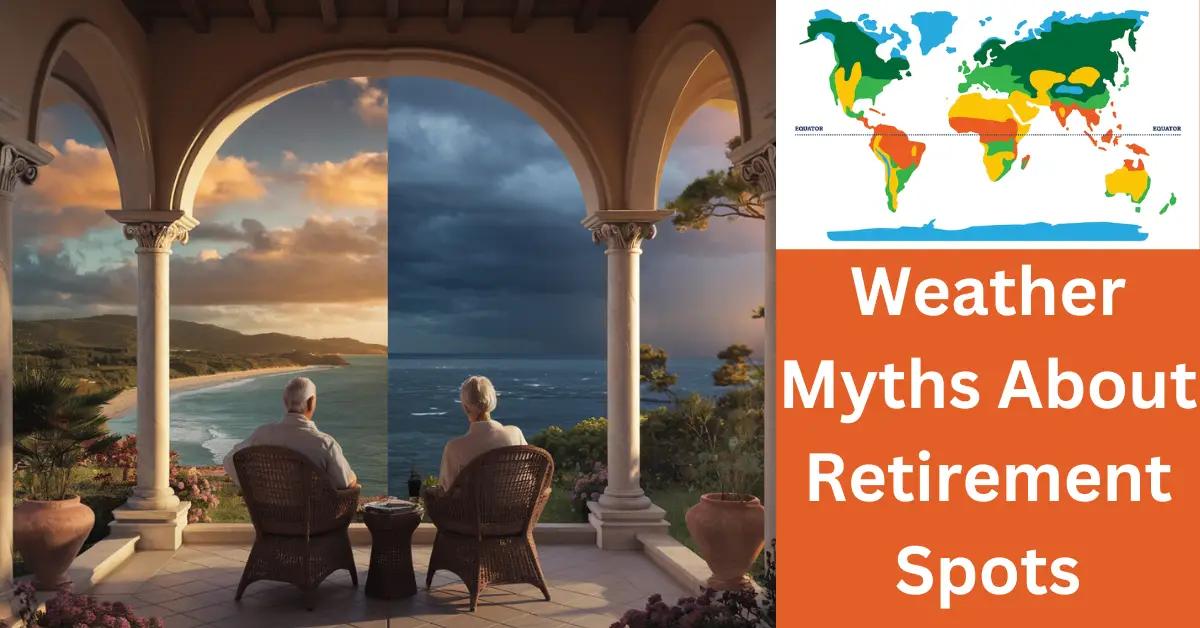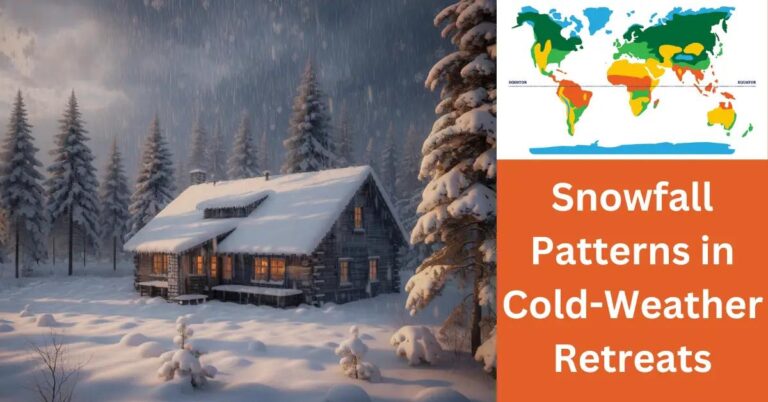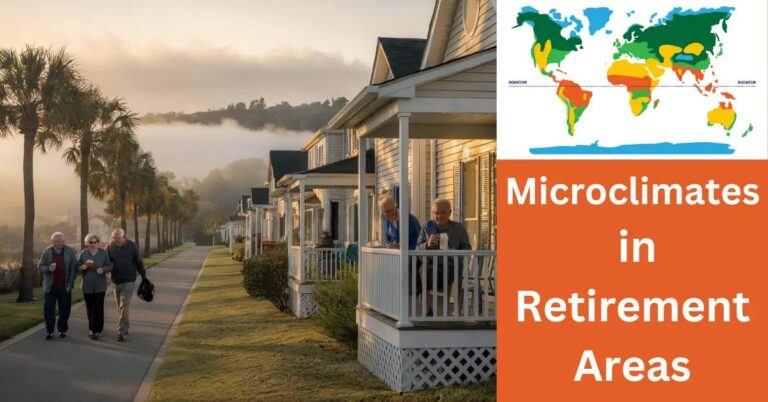TL;DR:
- Chasing "perfect" retirement weather is a myth; Florida has hurricanes and humidity, Arizona has extreme heat.
- Coastal areas aren't perpetually cool; Southern California can have wet and cold periods.
- Some southern states can experience icy winters; Texas may have snowstorms.
- Relying solely on short-term forecasts for retirement planning can lead to disappointment.
- Research long-term weather patterns and use reliable data sources.
- Weather impacts retirement well-being; understand climate needs and health implications.
- Tropical spots have challenges like humidity, wet seasons, and hurricanes.
- Warm retirement areas may not always be warm; some desert states have cooler mountain areas.
- Retirees should prepare for weather surprises with proper research and planning.
You've likely heard a lot about the sunny skies of popular retirement spots, but have you ever stopped to think which weather tales are true? In "Weather Myths About Retirement Spots: True or False?," I’ll explore how the legend of perfect weather often clouds our judgment. Let’s uncover the truth behind these myths, how they affect your retirement plans, and help you find a climate that’s just right for you. Ready to separate fact from fiction?
Weather Myths About Retirement Spots: What Are They?
A major mistake in retirement planning is chasing perfect weather. Many think places like Florida or Arizona have endless sunshine and mild evenings. But, as an expert in expat knowledge, I can tell you, it's not true. These spots often face extreme weather conditions. For instance, Florida is very humid and faces hurricanes. Arizona is scorching hot in summer, with temperatures soaring above 100 degrees.
Another weather myth suggests that coastal regions stay cool all year. While coastal areas might offer breezy summer days, winters can be chilly and wet. Southern California, often seen as a weather haven, can surprise you with unexpected drizzles and cold, foggy mornings.
These misconceptions can change your plans and comfort in retirement. Believing that all southern states always offer warmth is a common myth. Some southern areas can face icy winters. For instance, parts of Texas can have surprising snowstorms, catching retirees off guard.
Thinking every tropical area is paradise is another myth. Many retirees are blinded by dreamy postcard images. They forget about monsoon seasons and relentless humidity. This misunderstanding leads to unexpected costs for climate control, affecting budgets.
Weather myths can cause you to choose poorly. Before deciding where to retire, research thoroughly. Look into historical weather patterns. Understanding what weather is truly like helps make informed decisions.
Misconceptions can mask the real climate experience. You can't rely on assumptions. Use precise data when considering your retirement weather location. For more insights, refer to this linked resource on weather misconceptions.
Can You Rely on Weather Forecasts for Retirement Planning?
What is the golden rule for retirement? Make informed choices based on personal needs. When planning for retirement, weather plays a big role. The allure of sun-drenched locales can be tempting. But, before you pack your bags, it’s vital to dig deeper.
Where is the best place to retire with good weather? There's no one-size-fits-all answer. Preferences vary, and research is key. Many rely on short-term weather forecasts, but this can be a mistake. They provide only a snapshot, hardly enough for retirement planning. Focus instead on historical weather patterns to understand long-term climate trends.
Consider looking at tools and resources that offer reliable weather data. Websites like the National Weather Service can provide helpful insights. Publications, scientific studies, and regional climate reports can also be invaluable. They help paint a true picture of what to expect year-round.
Common errors arise when moving based solely on short-term forecasts. This often leads to unpleasant surprises and dissatisfaction. Relying solely on current weather outlooks might mislead you into thinking a spot is ideal.
To enhance retiree happiness, understand year-round climate impacts. Consider how weather affects daily life and well-being. For instance, some places might seem perfect in brochures but face seasonal challenges. Humidity, storms, or extreme temperatures can reduce quality of life.
Effective strategies involve breaking down the year’s climate into digestible insights. Check monthly averages for temperature, rainfall, and other conditions. This allows retirees to envision life during different seasons.
In closing, planning retirement involves thorough weather research. This ensures choices align with preferences for a fulfilling, comfortable life. A little extra effort in research today saves future headaches.
How Do Regional Climates Affect Retirement Choices?
What makes a good retirement spot for you? Some might think of warm beaches or sunny days, but don’t forget about climate change. How does climate change impact a retiree’s happiness and health? A mild climate may help retirees stay active, but some might prefer cold, crisp air.
Climate zones in the U.S. are diverse, affecting where retirees decide to settle. Some places are warm all year, while others have chilly winters and hot summers. Think about what weather makes you happy. Do you like snow or sunshine? Do you have health concerns that heat or cold might worsen?
The patterns of retiree migration show where people go to find their ideal weather. More retirees move to the Sun Belt in the U.S., where winters are mild and pleasant. But, some prefer the cooler Midwest or the scenic Northeast. It is vital to understand your climate needs before packing up.
Climate considerations can align with your retirement lifestyle goals. If gardening is your passion, a wide range of plants grows in different climates, but some areas might not fit your gardening dreams. Love hiking? Trails in all weather may not suit fragile climates. Good weather suits different outdoor hobbies but limits opportunities or comfort if too extreme.
For more insights on retiree migration patterns affected by climate, refer to related studies and articles. These resources help grasp trends and anticipate what to expect during retirement. Look for patterns like rising temperatures or shifts in rainfall, which directly affect safety and quality of life in retirement areas.
Keeping an eye on these aspects can guide you to a smart retirement choice, ensuring a cozy and happy future in your preferred region.
Do Warm Weather Retirement Spots Have Hidden Seasonal Challenges?
Some assume that warm weather spots always promise sunshine, but that's not true. Retirement in tropical spots might seem perfect, but there are hidden challenges. One big challenge is humidity. High humidity can create a sticky and uncomfortable feeling that lasts for months. It's not just the heat; it's how thick the air feels when you step outside.
Do tropically warm retiree destinations have unseen variations? Yes, different seasons bring different surprises in warm places. For example, the wet season can cause floods, which disrupt daily routines. Hurricanes also pose threats to safety and property, causing stress during retirement.
The mix of heat and humidity can affect your health and comfort. Many do not expect how draining the heat can be. Even simple outdoor tasks can feel tiring in this weather. It’s like carrying a weight around with you all day.
Pros and cons of tropical retiree spots? The warmth and vitamin D from the sun are pros. They are good for health and moods when not too extreme. But, adapting to high temperatures can be tricky. The cost of cooling homes can rise when trying to keep indoor spaces comfortable. This can surprise retirees on tight budgets.
Living in a place like a tropical paradise has its realities. It’s not always the dream it seems. You’ll need to weigh the costs of climate and adjust your routines. Unplanned weather can change life and may need new choices to stay happy. Understanding these realities helps handle unexpected challenges gracefully, ensuring retirement stays joyful.
What Should Retirees Know About Weather-Related Surprises?
When planning retirement, many dream of constant sun and warm beaches. But, imagine packing light clothes, only to find unexpected cold. First question: Are winter retreat spots always warm and sunny? No, they can surprise you with chilly winds or even snow. Some popular retirement places like Florida may face abrupt cold spells. It's wise to pack extra layers if you are moving there!
Conversely, what about spots known for snow and ice? Are these places always freezing cold and pricey? Not always. Some snowy places do have milder areas. Arizona, famous for deserts, can have cool mountain spots, great for quiet retirement without the chill.
Adapting to surprise weather can be easy if you act smart. Dress in layers so you can adapt if it gets cold. Checking local weather records before you move can also help. This ensures you know every possible weather twist at your new home.
Some retirees are surprised when known mild spots turn chilly. To avoid shocks, do solid research. How can you find a mild weather location for retirement? Search for places with stable weather patterns. Look up average temperatures online and talk to locals when you visit.
For more insights, you can explore lists of spots with stable weather. Global warming can make weather less predictable, but some regions still offer reliability. Always check recent weather pattern changes before choosing your spot.
Ultimately, retirees must prepare for surprises. Knowing real weather patterns helps make a well-informed move. So, pack for the unpredicted, and your retirement will be less surprising and more enjoyable!
Conclusion
Wrapping up, choosing your retirement spot requires careful thought about climate. Weather myths can mislead, so it's crucial to dive into actual weather data, not just forecasts. Stay aware of regional climates to match your lifestyle with the right climate zone. Don't overlook the challenges in warm regions or the surprises in milder areas. By focusing on these factors now, you're more likely to enjoy a comfortable, fulfilling retirement later. Choose your retreat not just for its allure but for its reality.












